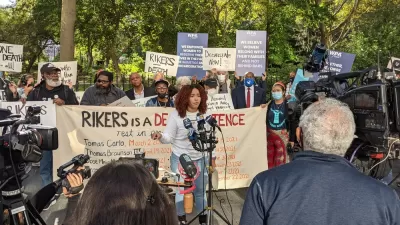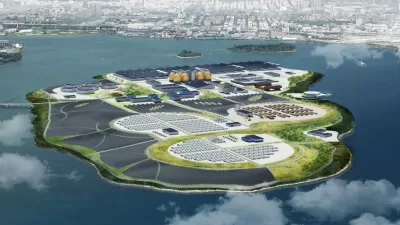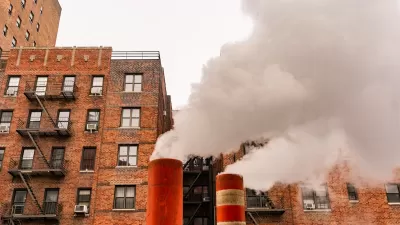With the prison complex slated to close by 2027, the city has an opportunity to transform the island into a renewable energy and research hub.

Writing in Time Out, Anna Rahmanan describes one possible future of New York’s notorious Rikers Island, which has served as a prison since 1932 and has become notorious for poor conditions and the violent treatment of prisoners. In 2019, the City Council voted to close the main prison complex, making way for new uses that could include sustainable energy and waste facilities.
“Last week, the Regional Plan Association and Rhode Island School of Design released a report based on the vision of the Renewable Rikers coalition—composed of folks that were formerly incarcerated on Rikers, plus their families and environmental and social justice groups—outlining their plans to transform the area into a green energy center.” The report proposes a research and training facility for formerly incarcerated people, a wastewater treatment plant, and recycling facilities.
According to Rahmanan, “The latter hub could potentially process over 365,000 tons of organic waste each year while also decreasing the amount of pollution currently produces by trucks on the road—that's in an of itself a huge deal.” Meanwhile, the wastewater treatment plant would replace similar facilities now located in Queens and the Bronx.
Andrea Johnson, assistant professor in the Master of Landscape Architecture program at the Rhode Island School of Design, said in a statement, “The carefully thought out designs we've presented in this report show how the entire island can be activated as an energy hub for all of New York City, while freeing large swathes of neighboring boroughs from aging energy infrastructure.”
FULL STORY: See what Rikers Island could look like when the prison complex closes

Planetizen Federal Action Tracker
A weekly monitor of how Trump’s orders and actions are impacting planners and planning in America.

Chicago’s Ghost Rails
Just beneath the surface of the modern city lie the remnants of its expansive early 20th-century streetcar system.

San Antonio and Austin are Fusing Into one Massive Megaregion
The region spanning the two central Texas cities is growing fast, posing challenges for local infrastructure and water supplies.

Since Zion's Shuttles Went Electric “The Smog is Gone”
Visitors to Zion National Park can enjoy the canyon via the nation’s first fully electric park shuttle system.

Trump Distributing DOT Safety Funds at 1/10 Rate of Biden
Funds for Safe Streets and other transportation safety and equity programs are being held up by administrative reviews and conflicts with the Trump administration’s priorities.

German Cities Subsidize Taxis for Women Amid Wave of Violence
Free or low-cost taxi rides can help women navigate cities more safely, but critics say the programs don't address the root causes of violence against women.
Urban Design for Planners 1: Software Tools
This six-course series explores essential urban design concepts using open source software and equips planners with the tools they need to participate fully in the urban design process.
Planning for Universal Design
Learn the tools for implementing Universal Design in planning regulations.
planning NEXT
Appalachian Highlands Housing Partners
Mpact (founded as Rail~Volution)
City of Camden Redevelopment Agency
City of Astoria
City of Portland
City of Laramie





























